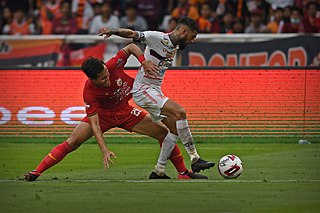Clubs as symbols of rival communities

In Scotland, the Old Firm derby in Glasgow featuring Celtic, historically linked to the city's Catholic community, and Rangers, similarly linked to the city's Protestant community, have also historically seen trends along ethno-political lines. [8]
The policy of Spanish football team Athletic Bilbao of picking only Basque players is strongly linked to Basque nationalism. [9] [10] This causes disputes between Athletic Bilbao and other Basque teams due to the Bilbao squad being able to use their economic power to purchase players who play for other important Basque teams who have strong youth ranks, such as CA Osasuna and Real Sociedad. In the same vein, FC Barcelona have since the late 1990s promoted from youth ranks a series of Catalan players such as Xavi and Carles Puyol. Indeed, the club is widely seen as the de facto representative of Catalonia, extending the Autonomous Community's reach to areas it otherwise would not be able to influence. However, their local rivals RCD Espanyol usually field more Catalan players than FC Barcelona and the best Catalan goalscorer in La Liga history Raúl Tamudo came through their youth ranks.
In Yugoslavia, NK Dinamo Zagreb and Red Star Belgrade were seen as symbols of Croatian and Serbian nationalism, respectively. On 13 May 1990, due to the rise of nationalism in the wake of the breakup of the country, an infamous riot broke out between the clubs' ultras during a league game in Zagreb.
In Canada, the Montreal Canadiens, the world's oldest and most successful professional ice hockey team, has always been a symbol for Francophone Quebeckers in Montreal. The teams has had rivalries in succession with the Anglophone Quebec's Montreal Wanderers and Montreal Maroons, as well as English Canada's Toronto Maple Leafs. As well, from 1975 to 1995 there was a rivalry with the Quebec Nordiques from Quebec City, which took on political overtones, with Canadiens fans being more likely to be Liberals and federalists, and Nordiques fans more likely Pequists and sovereigntists.
In Indonesia, one of the most successful clubs in Indonesian football Persipura Jayapura is considered to represent Papuan identity and it could be said to be one of the symbols of the campaign and struggle for Papuan independence. [11] In several matches, the flag of the Republic of West Papua, which is considered separatist by the Indonesian government, was flown several times. [12] In fact, one of the players, Edward Junior Wilson, who comes from Liberia, was involved in a fight with the Indonesian police because he thought he was flying the West Papua flag. This happened in the deciding match 2016 Indonesia Soccer Championship A at Mandala Stadium, Jayapura on 18 December 2016. At that time, Persipura, who managed to become champion after beating PSM Makassar 4–2, celebrated their victory after the match. Edward also raised the national flag of Liberia, However, because it was raining at the time, the police mistook the flag he was flying and there was a flag-pulling action with him. After the incident, the police revealed the misunderstanding that had occurred. This incident also sparked a riot between fans and police at the stadium. [13] For some Acehnese, Persiraja Banda Aceh is also considered to represent their Acehnese identity and the Free Aceh Movement. [14] In other cases, Persib Bandung is considered to represent the identity of Sundanese and West Java, especially the Priangan area and by some people it has been considered as their Sundanese culture. [15] By critical people, Persib is analogous to a symbol of resistance to Indonesian centrism which focuses on Jakarta (this is also related to its rivalry with Persija Jakarta). [16] [17] Persib is also considered "the national team of Bandung people", in fact the level of attendance at the stadium for Persib is higher than for the Indonesia national team when they play in Bandung. [18] [19] Low audience attendance for the Indonesian national team in Bandung this is also the background by sweeping actions and abuse carried out by rival supporters, The Jakmania against Bobotoh (the name for Persib supporters) when the Indonesian national team played in Jakarta, one of them was the attack on the capo of the Indonesian national team, who was also a Bobotoh on 28 October 2018 at Gelora Bung Karno Main Stadium by 30–50 The Jakmania members. [20] In 2022, a video showed the removal of a banner supporting the Indonesian national team at Sidolig Stadium in Bandung. In the video, the man who carried out the takedown said to the video viewer in Sundanese and English "Eweuh timnas, this is Persib!" ("There is no national team, this is Persib!"). This incident occurred during Indonesian national team training at the stadium. [21]





